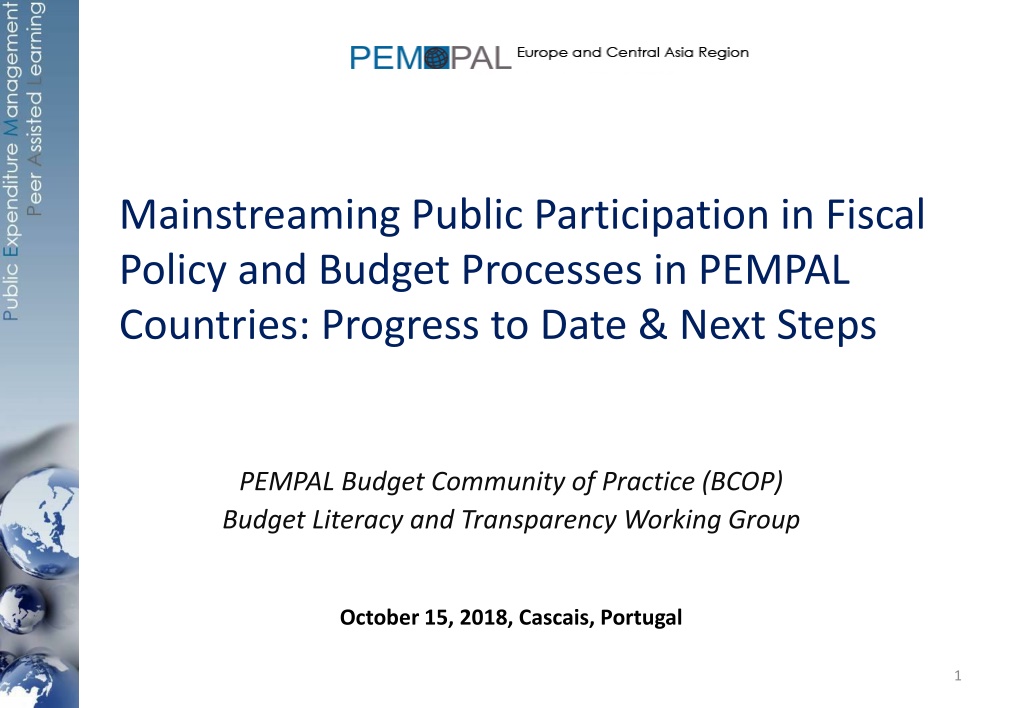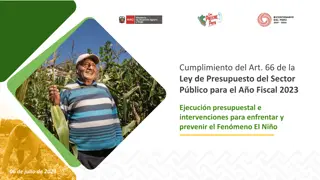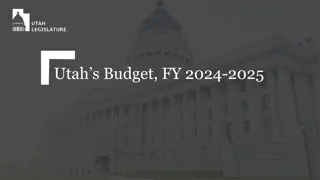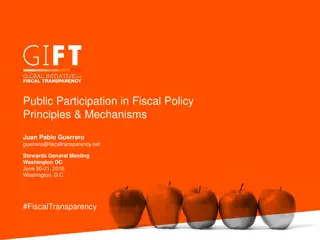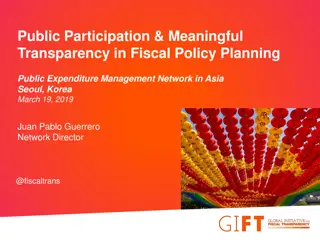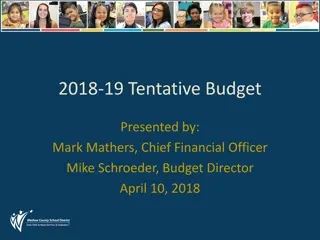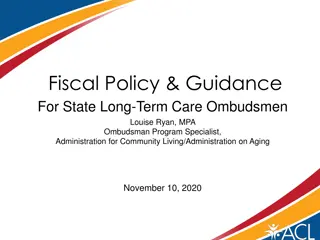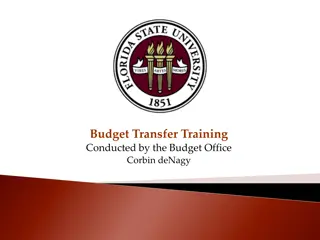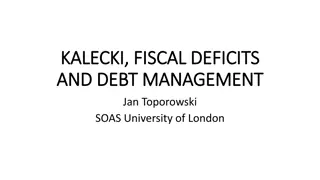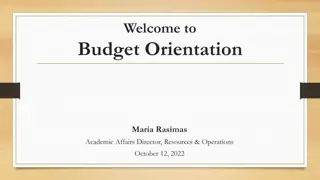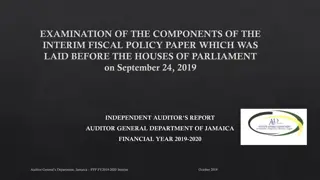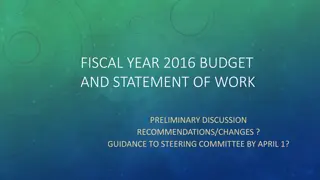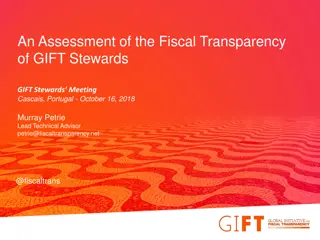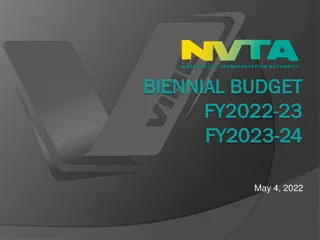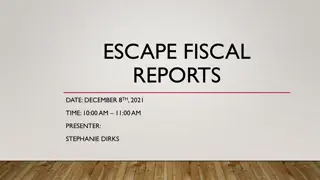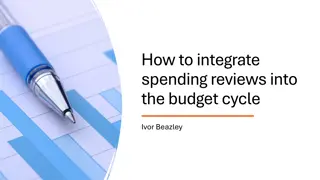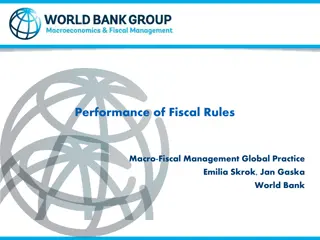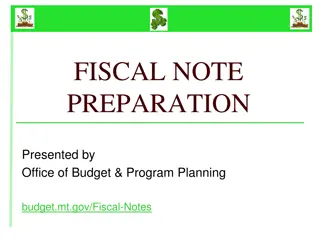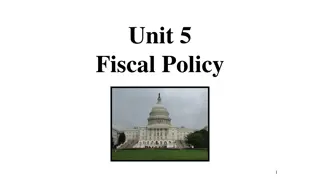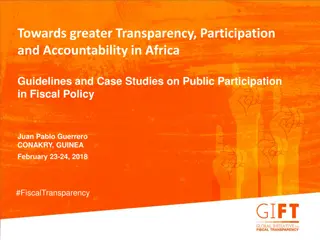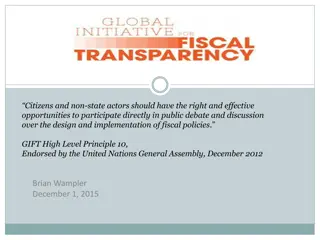Enhancing Public Participation in Fiscal Policy and Budget Processes in PEMPAL Countries
This document discusses the progress and next steps in mainstreaming public participation in fiscal policy and budget processes in PEMPAL countries. It covers definitions of public participation and budget literacy, outlines international frameworks, presents survey findings on public participation, and explores recommendations for improving participation in the budget cycle. The scope of public participation in various fiscal activities is also outlined.
Download Presentation

Please find below an Image/Link to download the presentation.
The content on the website is provided AS IS for your information and personal use only. It may not be sold, licensed, or shared on other websites without obtaining consent from the author. Download presentation by click this link. If you encounter any issues during the download, it is possible that the publisher has removed the file from their server.
E N D
Presentation Transcript
Mainstreaming Public Participation in Fiscal Policy and Budget Processes in PEMPAL Countries: Progress to Date & Next Steps PEMPAL Budget Community of Practice (BCOP) Budget Literacy and Transparency Working Group October 15, 2018, Cascais, Portugal 1
Definitions Public Participation Public participation refers to the variety of ways in which the public interacts directly with public authorities on policy design and implementation. The public includes citizens, civil society organizations (CSOs), academics and other non-state actors. Participation may be through face-to-face communication, deliberation or input to decision-making, or by written forms of communication including the Internet. Participation ranges from one-off consultation to on-going and institutionalized relationships, such as regular public surveys, administrative review mechanisms, standing advisory bodies, or citizen representation on governing bodies . Source: GIFT, 2016, Murray Petrie. Budget Literacy The ability to read, decipher, and understand public budgets to enable and enhance meaningful citizen participation in the budget process . Source: World Bank 2017 2
Outline 1. Overview of International Frameworks on Public Participation in the Budget Cycle 2. 2017 PEMPAL Survey: The Supply Side of Public Participation 3. 2017 PEMPAL Survey: The Demand Side of Public Participation 4. Recommendations 3
CHART : PUBLIC PARTICIPATION IN THE BUDGET PROCESS 2017: PEMPAL MEMBERS Source: based on the results of the 2017 IBP Open Budget Survey Turkey 0 Macedonia 0 Serbia 2 Albania 2 Romania 6 Tajikistan 7 Moldova 7 Czech Republic 9 BiH 9 Hungary 11 Azerbaijan 11 Russia 13 Kazakhstan 13 Georgia 22 Bulgaria 22 Croatia 26 Ukraine 30 Kyrgyz Republic 31 0 5 10 15 20 25 30 35 Score (max 100) 4
I. Overview of International Frameworks on Public Participation in the Budget Cycle 5
GIFTs Scope of Public Participation All fiscal policy and budget making activities including: The annual budget cycle (8 documents) Fiscal policy reviews that may extend over a longer period than the window for preparation of the annual budget cycle (on revenues, expenditures, tax, finances, assets, liability management) Design, production and delivery of public goods and services (including feedback and independent mechanisms) Design and delivery of public investment projects (planning, appraisal, selection, implementation & audit) 6
Budget Transparency Toolkit The design of a participation process should: Publish clear objectives, scope and process of public engagement in budgeting Tailor engagement methods that are best suited to various participants Use a mix of mechanisms, proportionate to the nature of the issue concerned Allow enough time for the results from participation to impact budget policy Follow up and give citizens timely feedback about progress and results Ensure that vulnerable population groups are included Public participation should: Be part of a broader government communication strategy Add to, complement or strengthen existing governance arrangements Include establishing timely consultative processes during the budget cycle Be supported by information on the effects of the budget on income and wellbeing of different income groups and households 7
Open Budget Survey: Executive Branch Engagement with the Public Topics for Engagement During Budget Formulation/Execution Participatory Practices Establish interactive participation mechanisms & involve a two-way conversation Take concrete steps to include vulnerable and under-represented groups Incorporate participation into its budget calendar/timetable Provide comprehensive information on the budget engagement process Provide the public feedback on how citizens inputs have been used At least one line ministry should use participation mechanisms that encourage interactive exchange with the public Macroeconomic issues/Changes in macroeconomic circumstances Revenue Forecasts, policies and administration/Collection of Revenue Social spending policies/Implementation of social spending Deficit and debt levels/Changes in deficit and debt levels Public investment projects/Implementation of public investment projects Public services/Delivery of Public services 8
Open Budget Survey: Engagement of Oversight Institutions with the Public Legislature Supreme Audit Institution Hold public hearings and/or use other participation mechanisms which are opened to everyone, through which the public and CSOs can provide input or testify (i.e. during pre-budget and/or approval stages; Audit Reports). Maintain formal mechanisms through which the public can suggest issues/topics to include in the SAI s audit program. Review and scrutinize Audit Reports produced by the SAI, and check on whether the Executive is taking the appropriate corrective actions based on the SAI s recommendations. 9
Public Participation & Closing the Feedback Loop: The Linchpin of International Frameworks Fiscal Transparency Feedback Loop Dimensions of Public Participation 10
II. 2017 PEMPAL Survey: The Supply Side of Public Participation 11
Questions What are the current (or planned) legislative and policy/procedural frameworks? Belarus Croatia What are the public participation mechanisms used across a) government b) line ministries c) Parliament d) SAI and at what stage of the budget process are they implemented? Kyrgyz Republic Russian Federation Is the Citizen s Budget used to engage citizens? Serbia What information is shared with the public prior to any consultation taking place? Uzbekistan Who collects the information; how is it collected; and on what issues is it collected? Is a response provided to inputs from citizens? 12
Current or Planned Legislative, Policy & Procedural Frameworks All surveyed countries have frameworks which endorse the principles of transparency & public engagement Countries with more generic legislative, policy or institutional frameworks that endorse public participation are less specific about the mechanisms that are being used to engage the public in the budget process (Belarus, Serbia, Uzbekistan) Only 3 countries specified that they have procedural measures in place to ensure accountability for closing the feedback loop on public consultations (Croatia, Kyrgyz Republic, Russian Federation) 13
Current or Planned Legislative, Policy or Procedural Frameworks Budget Code. Chapter on Budget and Budget Process Transparency and Openness (Kyrgyz Republic) Resolution On Compiling the Citizens Budget of the Kyrgyz Republic Decree of the Council of Ministers to establish a working group on simplification of the tax system (Belarus) Budget Specific Laws & Decrees Constitution of the Republic of Uzbekistan (Articles 29 and 30) Constitution of the Russian Federation (Article 101) Constitutions Law of the Republic of Belarus On Petitions of Citizens and Legal Entities Act on the Right of Access to Information (Croatia) Code of Consultation with the Interested Public Concerning the Adoption of Acts, Regulations and Legislation (Croatia) National Laws & Decrees 14
Current or Planned Legislative, Policy or Procedural Frameworks Regulation on the Implementation of Evaluation of the Impact of Regulations (Croatia) Rules of Procedure of the Government of the Republic of Croatia Law of the Republic of Uzbekistan On Local Public Administrations Federal Law On General Principles of Organization of Local Self- Government in the Russian Federation Resolution 781/39 of the Government of the Moscow Region dated October 25, 2016. Power that Delivers for the Period of 2017 - 2021 (subprogram IV: Management of Public Finance of Moscow Region) (Russian Federation) Law 654-PK of Perm Krai (Territory) of June 2, 2016 On Implementation of Participatory Budgeting Projects in Perm Territory (Russian Federation) National Regulations Laws Pertaining to Local Government 15
Public Participation Mechanisms In addition to the preparation and execution of the national budget, CSOs, technical experts & citizens have engaged with the executive branch & Parliament on overall economic & fiscal policy measures, taxation & the implementation & performance of national programs A broad range of mechanisms are being used to engage citizens in the budget process, such as technical working groups on fiscal issues; NGO inputs on draft budget documents; reviews and comments by think tanks/academics; participatory budgeting & online simulations & games. Online/written petitions and budget hearings/consultations are being used by the majority of countries 5 countries use public participation mechanisms during the budget preparation stage & 2 countries use them during the budget execution stage (Kyrgyz Republic & Russian Federation). 1 country has established an avenue for public engagement during the audit stage (Russian Federation) 16
Public Participation Mechanisms Preparation Execution Audit The Government publishes the proposed state budget with all prescribed annexes (Croatia) Information on budget execution is posted on the web site of the Ministry of Finance (Uzbekistan) The National Audit Office publishes the audit of the annual report of the execution of the state budget (Croatia) The Parliament makes the draft budget available prior to conducting public hearings (Kyrgyz Republic) An aggregate report on the implementation of state programs is available on the Ministry of Economy website (Belarus) Inform Line ministries are obliged to publish their strategic plans on their websites (Croatia) The Fiscal Advisory Council s assessment of the budget proposal is published on the website of the Fiscal Advisory and submitted to the National Assembly (Serbia) 17
Public Participation Mechanisms Preparation Execution Audit The MoF conducts public hearings on the draft budget proposal of the Central Government (Kyrgyz Republic) The MoF conducts budget hearings to survey public opinion on the semi-annual outturn report & on the draft annual report (Kyrgyz Republic) Advisory board under the Ministry of Taxes and Charges participates in public discussions on draft regulatory & legal acts related to tax legislation (Belarus) The Federal Law On General Principles of Organization of Legislative & Executive Authorities requires public hearings on draft budget to be convened on annual reports on budget execution of the RF constituents (Russian Federation) Consult The State Duma Committee on budget and taxes holds parliamentary hearings entitled Key Areas of Budget, Tax and Customs Tariff Policies for the Next Fiscal Year (Russian Federation) A working group that includes civil society representatives has been established to prepare proposals on simplification of the national tax system (Belarus) The Trilateral Commission for Regulation of Social & Labor Relations reviews & provides inputs on revised consolidated annual reports on implementation progress of national programs (Russian Federation) Public Councils participate in generating reports on audit operations (Russian Federation) Collaborate 18
Use of Citizens Budgets Belarus The Citizens Budget is being developed and is available through the website of the Ministry of Finance Croatia The Citizens Guide to the Budget contains information that is simple & easily understandable. It is posted on the Ministry of Finance website and hard copies of brochures are also made available to the public Kyrgyz Republic The Government Resolution on Compiling the Citizen s Budget of the Kyrgyz Republic outlines a methodology to develop & publish the Citizen s Budget version of: oCentral Government s draft budget proposal oAdopted Law on the Central Government s budget oDraft law adopting the report on the Central Government s budget execution The Citizen s Budget is not being used to engage the public in budget hearings since it is in the process of being compiled All 3 countries are in the process of developing Citizen s Budgets 19
Use of Citizens Budgets [2] At the central government level, the Citizen s Budget is of an indicative nature and is not being used to engage the public in parliament hearings. By 2017 72 out of 85 regions in the Russian Federation are utilizing Citizen s Budgets to engage citizens in the public hearings that are convened to discuss the draft budget and budget execution reports. The Citizen s Budget was published for the first time in 2015 It was updated after the Budget Act was adopted by the National Assembly and published on the website of the Ministry of Finance A concept to develop the Citizen s Budget of the Republic of Uzbekistan was prepared in November 2017 Russian Federation Serbia Uzbekistan The 3 countries already publish Citizen s Budgets, with 2 countries that have developed them for the subnational level as well (Croatia, Russian Federation) 20
Information shared with the Public Prior to Budget Consultations Belarus Topics and schedules for direct lines with the MoF (Belarus) Croatia A citizens guide to the budget in the form of brochures on: The state budget and projections adopted by the Parliament The semi-annual and annual reports on the execution of the state budget (Croatia) Kyrgyz Republic Public hearing announcements & agenda & presentations of government authorities are published on the MoF website 10 days in advance (Kyrgyz Republic) Russian Federation Information on parliamentary hearings is published at least 10 days in advance & should include: the topic of discussion, along with the date, time, location and procedure of the hearings and determination of their results (Russian Federation) 4 countries that convene public budget hearings or consultations provide the public with an advance notice of 10 days on average In addition to the draft budget proposal and other budget documents, 2 of the 4 countries that organize budget hearings/consultations provide background information in other formats that are more user friendly (Croatia & Kyrgyz Republic) 21
Measures for Responding to Public Inputs 3 of the 4 countries that organize budget hearings/consultations have taken steps to close the loop on if/how public comments were addressed or incorporated (Croatia, Kyrgyz Republic) 2 countries have specified a 15 day timeframe within which citizens are to receive a response to their petition (Belarus, Kyrgyz Republic) There are no specifics or examples regarding the number of petitions that were addressed during a specific timeframe 22
Measures for Responding to Public Inputs Belarus If a question/feedback cannot be addressed during direct line consultations & requires additional investigation, a written response is provided to the citizen within 15 calendar days If the amount of time to respond to a petition exceeds one month, then an update is provided to the petitioner to explain the reason for the delay and the timeline by which s/he can expect a response/action A proposal to establish a centralized internet portal to receive citizens petitions is currently under consideration Croatia Public authorities are obliged to inform the interested public via their website on the accepted and reject proposals and comments, after the public consultations have ended National, regional & local government entities are to publish their reports on public consultations that have been conducted consultations The explanation of the bill sent into parliamentary procedure states why certain suggestions have been accepted or rejected Kyrgyz Republic Following the public hearing on the budget, the KR Ministry of Finance publishes its minutes and summarizes the comments/suggestions that were provided. The Citizens Petitions section on the MoF website is another avenue for the public to provide comments & suggestions on the draft republican budget and budget execution reports. Per KR legislation, responses to citizens petitions must be provided within two weeks 23
Measures for Responding to Public Inputs Serbia The Fiscal Advisory Council s assessment of the budget proposal is published on the website of the Fiscal Advisory and submitted to the National Assembly It is mandatory that the decisions of Public Council meetings as well as other documentation is posted online (including experts reviews of the regulatory drafts and other documents, annual action plans and annual reports on the outcomes of the Public Council s activities) Open parliament hearings are covered by mass media & relevant materials and shorthand transcripts are furnished to the Parliament library within 10 days. Recommendations from open parliament hearings may be published in press, and are placed with the Fund of Electronic Information Resources of State Duma Russian Federation 1.3 million petitions have been submitted to public bodies through the Integrated portal of interactive public services during the past 4 years which have contributed to the adoption of measures on several issues. The virtual office of the President of the Republic of Uzbekistan is another avenue for handling petitions from physical persons and legal entities and had received 1 million petitions by July 2017. Other departments have also established virtual offices where citizens can send their petitions by e-mail or through a feedback form. The section on Tax and Customs Policy is another forum for citizens to provide feedback. Uzbekistan 24
III. 2017 PEMPAL Survey: The Demand Side of Public Participation 25
2017 PEMPAL Survey: The Demand Side of Public Participation Questions Who participates (certain groups, or is it open to all)? Are vulnerable or under-represented people, or the CSOs that represent them, included in any consultations? Are there CSOs in the country that are actively looking at budget information e.g. If applicable, do countries know which CSOs were engaged to implement IBP s Open Budget Survey? Is there any budget related training provided by MoF or other government agency for CSOs, journalists, media representatives? Is there a budget literacy strategy aimed at improving literacy of citizens, certain groups? If so provide objectives, scope and details of such a strategy. 26
Who Participates in the Budget Process? Direct lines are open for everyone, without any limitations. Everyone who is interested can join the debate on the bill. All received questions must be answered. The public has no direct influence on the drafting of the proposed budget, but it can indirectly influence the members of parliament through the media. Participation in public hearings is open to all. Since 2013 public hearings on the Central Government s budget are attended by the representatives of government ministries, public councils, CSOs and technical experts Public Councils can engage Russian citizens, NGOs and other associations of citizens not represented in the public council directly and/or by seeking their opinions, proposals and comments. Parliamentary hearings are open to the mass media, NGOs and the general public. Belarus Croatia Kyrgyz Republic Russian Federation Serbia - Uzbekistan The MoF is making attempts to involve experts and other stakeholders in discussions and adoption of key budget documents. Although no groups are excluded from participating in the fiscal process, it is unclear whether vulnerable or under-represented groups have opportunities to be represented 27
CSO Engagement in the Fiscal Process Conducting budget analysis (Belarus, Croatia, Kyrgyz Republic, Serbia, Russian Federation) Conducting open budget surveys at the local and regional self-government levels (Croatia) Publishing opinions & explanations of PFM issues in newsletter and press releases (Croatia) and on the State Duma website (Russian Federation) Developing an online tool for geo-visualization which depicts budget data for cities & municipalities, and which can be used to create various budget scenarios & solutions (Croatia) Participating in working groups and advisory boards on fiscal issues (Belarus, Russian Federation) Participating in the national biennial Open Budget Survey conducted by the International Budget Partnership (Croatia, Kyrgyz Republic, Russian Federation, Serbia) 28
Trainings on Budget Related Issues for NGOs, Journalists & Media Although none of the public entities in the surveyed countries systematically organize trainings, there have been efforts by development partners in the Kyrgyz Republic & Uzbekistan towards this end Only one of the countries surveyed envisions organizing trainings for media & journalists (Uzbekistan) 29
Does the MoF or other public organization conduct trainings on budget related issues for NGOs, journalists & media? The Minister of Finance, as well as deputies & heads of relevant units usually address the public, journalists & representatives of mass media. The MoF and other government entities do not conduct trainings for CSOs, journalists or media representatives. However, MoF representatives participate in round tables and consultations organized by the academic community and CSOs. Government entities do not organize systematic trainings on the budget for CSOs, journalists, and media representatives. However, such trainings are delivered through projects financed by development partners & MoF staff may be engaged as speakers The MoF & other government agencies do not provide systematic training related to budget issues for CSOs, journalists and media. Belarus Croatia Kyrgyz Republic Russian Federation Serbia - Uzbekistan In 2014, the training center under the MoF organized a training workshop for representatives of mass media with the support of the UNDP Project on Reform of the Budget System in Uzbekistan . The Concept of preparation and publication of the Citizens Budget for 2018-2019 envisions organization of trainings for media & journalists on key issues covered by the Citizens Budget. 30
Is there a Is budget literacy strategy intended for citizens Is there a Budget Literacy Strategy that is Intended for Citizens or other Groups? The MoF-led national program on Management of Public Finance and Regulation of Capital Markets in the Russian Federation has included activities to improve the budget literacy of people and organizations engaged in the participatory budgeting process The Russian Federation s MoF has developed & piloted a training course on Budget Literacy for high school students & Uzbekistan s MoF has initiated a project on preparing a Budget Literacy training course for school children 31
Is there a budget literacy strategy intended for citizens or other groups? Belarus NO Croatia NO Kyrgyz Republic NO Russian Federation Training materials on improving financial literacy include a unit on public finance and taxation with a summary of a fiscal system and other issues. The MoF implemented a World Bank supported project on Improvement of Budget Literacy of High School Students from 2015-17 that was intended to develop civic consciousness among youngsters & skills to actively engage in the budget process. A package of learning and teaching materials was developed under the project to support the Budget Literacy for High School Students training course. The MoF-led national program on Management of Public Finance and Regulation of Capital Markets has included activities to improve the budget literacy of people and organizations engaged in the participatory budgeting process. Serbia - Uzbekistan The MoF s Training Center has initiated a project on preparing a Budget Literacy Training and has created a training package for schoolchildren 32
Recommendations There is scope to strengthen public participation in the budget process by: Sharing user-friendly versions of draft budget documents in advance of public hearings, such as citizen s budgets and brief presentations in addition to the existing information on the schedules, contents etc Continuing to use various public participation mechanisms during the budget preparation stage, and citizen engagement efforts during the stages of budget execution & audit Encouraging line ministries & SAIs to utilize interactive public participation mechanisms, particularly during the stages of budget execution and audit Issuing guidelines to specify the role of citizens in the budget process & the steps required to address their feedback in a timely manner, particularly in contexts where overarching legislative frameworks do not provide detailed advice Encouraging public entities to organize regular budget literacy sessions/trainings for NGOs, journalists/media in collaboration with development partners, or exploring arrangements for think tanks/academia to assume the lead in collaboration with the MoF, line ministries & local governments Consider piloting budget literacy courses for adults and/or youngsters, either as stand-alone modules or as part of financial literacy/civic education 33
WG BL Knowledge Products available for download link Title ENG: https://www.pempal.org/sites/pempal/files/filefield_paths/bcop_public_particip ation_backgroud_paper_august2017_eng.doc RUS: https://www.pempal.org/sites/pempal/files/filefield_paths/bcop_public_particip ation_backgroud_paper_august2017_rus_full.doc BCS: 1. Public Participation in Fiscal Policy and the Budget Process How to establish and/or strengthen mechanisms in PEMPAL countries? Background paper https://www.pempal.org/sites/pempal/files/filefield_paths/bcop_public_particip ation_backgroud_paper_august2017_bcs.docx ENG: 2. Breaking Challenges in Constructing Citizens Budgets for PEMPAL Countries https://www.pempal.org/sites/pempal/files/event/2017/Budget%20COP%20Eve nts/Jun22_Moscow%2C%20Russian%20Federation/files/bcop_citizens_budgets_ june2017_eng.doc RUS: https://www.pempal.org/sites/pempal/files/event/2017/files/bcop_citizens_bud gets_june2017_rus.doc BCS: https://www.pempal.org/sites/pempal/files/event/2017/Bud%C5%BEet%20Dog a%C4%91aji/Jun22_Moskva%2C%20Rusija/files/bcop_citizens_budgets_june201 7_bcs.docx 34
Thank you for your attention! Questions can be referred to: Maya Gusarova, Sr. Public Sector Specialist mgusarova@worldbank.org Anna Belenchuk, PEMPAL BTLWG Leader Anna.Belenchuk@minfin.ru 35
